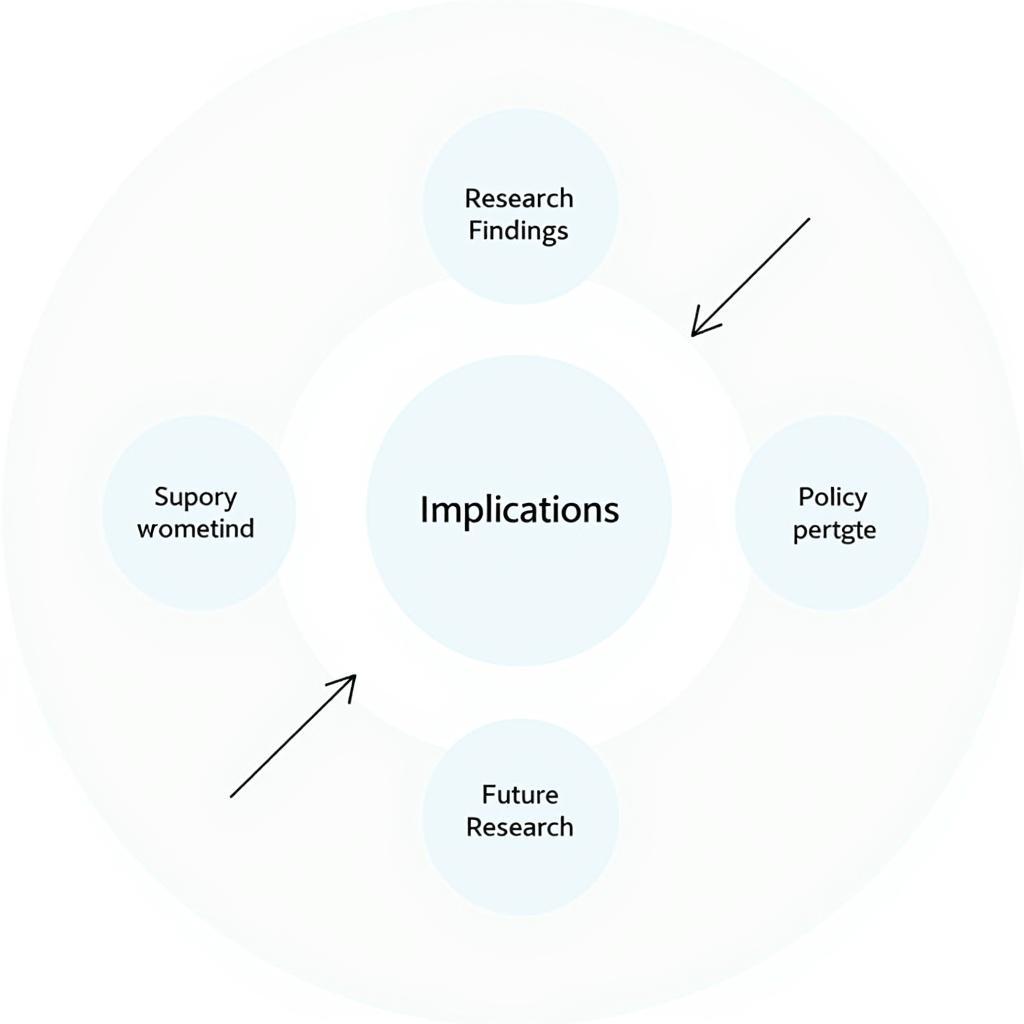When we delve into the world of research, whether it’s exploring the mysteries of the paranormal or understanding the complexities of human behavior, we often come across the term “research implications.” But what does this phrase truly signify?
This article aims to shed light on the meaning of research implications, exploring their significance and impact on various fields.
Unpacking the Essence of Research Implications
In simple terms, research implications are the potential real-world effects or consequences of academic studies. They bridge the gap between theoretical findings and practical applications, highlighting how research insights can be used to solve problems, make informed decisions, and shape our understanding of the world around us.
 Research Implications Diagram
Research Implications Diagram
Types of Research Implications
Research implications can be broadly categorized into three types:
- Practical Implications: These relate to the direct application of research findings to address real-world issues. For example, a study on the effectiveness of a new therapy for anxiety could have practical implications for mental health professionals.
- Theoretical Implications: These focus on advancing our understanding of a particular concept or theory. For instance, research on paranormal phenomena might contribute to new theories about consciousness or the nature of reality.
- Policy Implications: These highlight how research findings can inform the development or revision of policies and regulations. A study on the impact of climate change on a specific region could have policy implications for local governments.
The Importance of Identifying Research Implications
Identifying and articulating research implications is crucial for several reasons:
- Relevance and Impact: It demonstrates the value and potential impact of the research on society, justifying the need for further investigation.
- Guiding Future Research: Implications often point towards new research questions and areas that require further exploration.
- Informing Decision-Making: By understanding the implications, stakeholders can make informed decisions based on evidence-based insights.
Practical Examples of Research Implications
To further illustrate the concept, let’s consider a few examples:
- A study on the effects of electromagnetic fields on human health could have implications for the placement of cell phone towers.
- Research on the effectiveness of educational interventions could inform the development of new teaching methods.
- An investigation into the causes of paranormal experiences could lead to a deeper understanding of human perception and consciousness.
The Role of Researchers in Communicating Implications
Researchers play a crucial role in effectively communicating the implications of their work to relevant audiences:
- Clear and Concise Language: Use accessible language to explain complex findings and their potential consequences.
- Target Audience: Tailor the message to the specific needs and interests of the intended audience.
- Collaboration and Engagement: Engage with stakeholders and practitioners to explore how research findings can be translated into practical solutions.
Conclusion
Understanding the meaning of research implications is crucial for both researchers and those who utilize research findings. By bridging the gap between theory and practice, implications highlight the real-world value of research and its potential to shape our understanding of the world around us. Whether exploring the unknown depths of the paranormal or addressing pressing societal issues, recognizing and communicating research implications is essential for maximizing the impact and relevance of academic endeavors.
FAQs
1. What is the difference between research findings and research implications?
Research findings are the direct results of a study, while research implications interpret those findings and discuss their potential impact.
2. How can I identify the implications of my own research?
Ask yourself: “What are the potential consequences of my findings?” and “How could my research be used to solve problems or improve current practices?”
3. Do all research studies have implications?
While all research contributes to knowledge, some studies may have more direct or immediate implications than others.
4. What is the role of peer review in evaluating research implications?
Peer reviewers assess the validity and significance of research implications, ensuring they are well-supported by the study’s findings.
5. Where can I learn more about research implications in a specific field?
Consult with experts in that field, read relevant academic journals, and attend conferences and workshops.
Need Help With Your Research?
If you need assistance with understanding research implications or any other aspect of your research, our team at Paranormal Research is here to help.
Contact us at:
- Phone Number: 0904826292
- Email: [email protected]
- Address: No. 31, Alley 142/7, P. Phú Viên, Bồ Đề, Long Biên, Hà Nội, Việt Nam.
Our customer support team is available 24/7 to answer your questions and provide guidance.
You can also find more information on our website:
- Learn more about the definition of causal research: definition of causal research
- Discover the impact factor of the Journal of Clinical and Translational Research: journal of clinical and translational research impact factor
- Explore the intriguing concept of the professor’s research holo
- Gain insights from an experienced education research specialist
- Delve deeper into the question of what does implication mean in research
We encourage you to explore these resources and continue your journey of discovery.